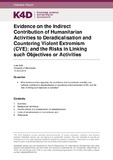| dc.contributor.author | Kelly, Luke | |
| dc.date.accessioned | 2019-08-13T14:18:38Z | |
| dc.date.available | 2019-08-13T14:18:38Z | |
| dc.date.issued | 2019-06-13 | |
| dc.identifier.citation | Kelly, L. (2019). Evidence on the Indirect Contribution of Humanitarian Activities to Deradicalisation and Countering Violent Extremism (CVE); and the Risks in Linking such Objectives or Activities. K4D Helpdesk Report 625. Brighton, UK: Institute of Development Studies. | en |
| dc.identifier.uri | https://opendocs.ids.ac.uk/opendocs/handle/20.500.12413/14643 | |
| dc.description.abstract | The retreat of Daesh in Iraq and Syria, and groups such as Boko Haram in Nigeria, has led to some interest regarding what indirect contribution humanitarian activities may have on ‘deradicalisation’ or CVE elements. There is very little evidence on the indirect effects of humanitarian programmes on deradicalisation, although some suggestion that promoting humanitarian values may contribute to countering violent extremist views or provide an alternative set of values to those offered by armed groups. However, there is some evidence on intentional countering violent extremism (CVE), disarmament, demobilisation, and reintegration (DDR) and psychosocial support among former members of armed groups in contexts including Syria, Nigeria and the Central African Republic, which may have some modest relevance to those working within such contexts. There is some evidence that insufficient or withholding aid can contribute to radicalisation. Long-term stays in refugee camps can lead to feelings of frustration and worthlessness, which can aid radicalisation. Several humanitarian organisations have also warned of the risks to humanitarian principles of explicitly linking deradicalisation with humanitarian work. However, there are no evaluations of this. The evidence-base for this overall issue is very limited. The only sources which mention the issue directly are statements of principle by the International Committee of the Red Cross (ICRC), the Norwegian Refugee Council (NRC) and a briefing note by the Syrian International NGO Regional Forum (SIRF). | en |
| dc.language.iso | en | en |
| dc.publisher | IDS | en |
| dc.relation.ispartofseries | K4D Helpdesk Report;625 | |
| dc.rights.uri | https://www.nationalarchives.gov.uk/doc/open-government-licence/version/3/ | en |
| dc.subject | Aid | en |
| dc.subject | Governance | en |
| dc.subject | Security and Conflict | en |
| dc.title | Evidence on the Indirect Contribution of Humanitarian Activities to Deradicalisation and Countering Violent Extremism (CVE); and the Risks in Linking such Objectives or Activities. | en |
| dc.type | Helpdesk | en |
| dc.rights.holder | © DFID - Crown copyright 2019 | en |
| dcterms.dateAccepted | 2019-06-13 | |
| rioxxterms.funder | Department for International Development, UK Government | en |
| rioxxterms.identifier.project | K4D | en |
| rioxxterms.version | VoR | en |
| rioxxterms.funder.project | 238a9fa4-fe4a-4380-996b-995f33607ba0 | en |

